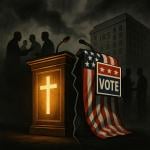KAYLIN (no location posted) ASKS:
Why don’t Quakers celebrate religious holidays?
THE GUY ANSWERS:
For a couple centuries, avoidance of common Christian observances such as Easter and Christmas was as distinctive a tenet among the Quakers (a.k.a. Friends) as their famed pacifism. There are exceptions but that’s largely in the past, especially with Christmas. The Friends General Conference explains that “traditionally Quakers did not celebrate any religious holidays because all days are ‘holy days’,” but today “most Quakers celebrate a low-key Christmas, and sometimes Easter, as part of our larger culture.” Quakers will typically downplay festivities and reject the commercial push toward materialism in gift-giving, in line with the faith’s principle of simple living. Local Friends meetings differ regarding whether and what holiday worship services to hold, just as Quaker branches are divided in theology between liberals and evangelicals. There’s lively discussion on the Internet about Quaker families’ seasonal practices at home.
George Fox (1624 – 1691), an Englishman oft imprisoned for his faith, is commonly regarded as Quakerism’s founder. He was influenced by the Puritan movement, which opposed Christmas celebrations and outlawed them when it ruled Massachusetts colony during Fox’s lifetime. Fox indicated his feelings in an early journal entry, noting that while others indulged in Christmastime feasting and frolicking “I looked out poor widows from house to house and gave them some money.” (Nowadays, the Friends’ George Fox University in Oregon happily programs Christmas concerts and Easter egg hunts.)
The 1806 Rules of Discipline for the Philadelphia Yearly Meeting of Friends declared the predominant policy that believers cannot join in “public fasts, feasts, and what they term holy days” that were “devised in man’s will” (i.e. not by God’s will) because “outward observations” have been supplanted by “the spiritual dispensation of the Gospel.” Each day of the year was to be holy unto God, not just special “days and times.” That same emphasis on inner spiritual life over outward ceremony underlies the Quakers’ elimination of baptism and the Lord’s Supper, which remains a distinctive practice for all segments of the faith.
Jehovah’s Witnesses strictly forbid Christmas and Easter observances for a reason that some Quakers have also cited, that these holidays lack a biblical basis and stem from paganism. Similarly, in bygone days the Quakers followed a “plain” or “scriptural” calendar that rejected common English names for days of the week and the months because they originally referred to worship of the sun and moon (Sunday, Monday) or pagan deities (January for Janus, Thursday as Thor’s day). Instead, Quakers would speak of First Day, First Month, etc.












